

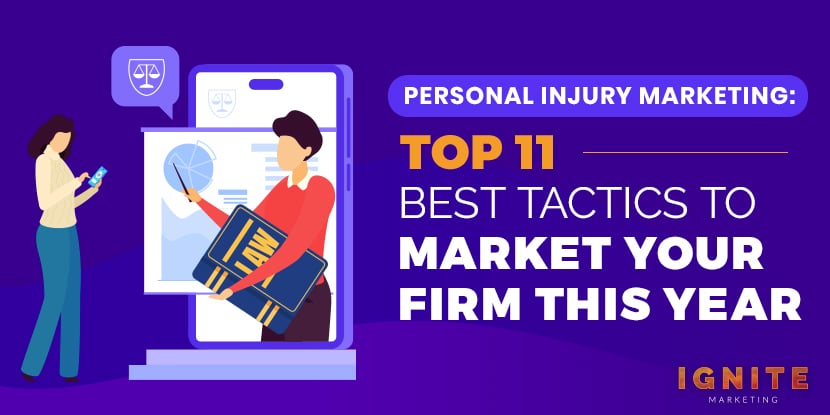
Nobody ever said that personal injury marketing was easy. You might spend thousands of dollars on marketing and bring in dozens of potential leads, but only convert on 10% of them. Add on the fact that very few people need a personal injury lawyer at any given moment, and you can understand why so many personal injury law firms struggle to generate business.
The best personal injury marketing tactics are digital. These tactics include investing in SEO services, registering your firm on Google My Business, and creating targeted social media ads. Revamping your firm’s website to include blog posts as well as landing pages is also an effective strategy.
The days of cold calling and Every Door Direct Mail (EDDM) are long-gone. It’s time to step up your marketing tactics and improve your revenue like never before. To learn about the 11 best tactics for marketing your law firm in 2021, continue reading.
Research shows that more than 53% of traffic to a website will come from an organic search. That means that a person typed in a certain phrase or keyword into the Google search bar and found their way onto your law firm’s site (such as “personal injury attorney in Dallas”).
Yet, just creating a website for your personal injury law firm doesn’t guarantee web traffic.
Think about how many other personal injury law firms there are in your state; let alone the entire country. Search engines don’t just randomly choose the websites that show up on Google’s top listings. Google will intentionally show websites that are relevant to the search and are reliable.
That’s where SEO enters the picture.

SEO is a marketing strategy where you’ll use specific keywords on your law firm’s website to prove to Google that your website is reputable. These keywords can be used in your website copy or even through blog posts that you publish, driving traffic to your site.
Over several months or years, an effective SEO strategy will help you to clinch that coveted first slot for at least one keyword on Google. The higher your rank, the more likely a potential client will visit your website. There’s only a 25% chance that a user will find your site if your firm is listed on the second page of search results.
While it’s clear that SEO is one of the most effective marketing strategies for law firms, the $2,500+ monthly price tag might be a little much for a smaller firm.
A Google search will do wonders when it comes to marketing your business in your local area. That’s all thanks to an extremely useful tool called “Google My Business.”
This service will note a Google user’s physical location when searching for something like “personal injury law firm.” The first page of the search results will include a map and a list of a few local businesses meeting this search term.
This will help to bring your law firm front and center to people who are looking to hire a local personal injury lawyer. Your Google My Business listing will also provide a link to your site as well as contact information.
The research shows that this feature can help your law firm to be seen over 1,000 times by local searchers every month. About 5% of those who see your listing will visit your website to get more information.
Based on the data, that means this service alone might bring your website an additional 50 visitors each month. If you’re working with a 10% lead conversion rate, you might bring in an additional five clients every month.
Most importantly, you need to make sure that your Google My Business profile is up-to-date.
To do that, make sure that you either add or claim your business on Google and update all of your information. There should be no discrepancies when it comes to your phone number, address, or firm name.
Research shows that about 80% of law firms have some form of presence on social media within the last few years. About 54% of those firms on social media currently have an active Facebook profile.

An account on Twitter, Instagram, Facebook, or any other social media platform is useful for both marketing and professional relationships. You can use these platforms to post useful information about legal topics, interact with your followers, or even advertise your firm.
What sets Facebook ads apart is that they can be targeted.
That means that instead of just advertising your firm to every person in your city with a Facebook account, you can choose your ideal audience.
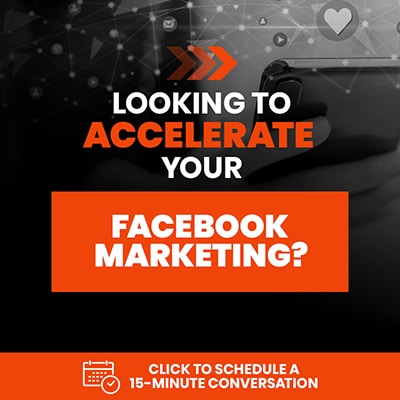 So you need to have a general understanding of who’s more likely to hire a personal injury attorney. That means that if you know that 60% of your clients are aged 50 and older or live in a certain community, you can intentionally have your ads show for those users.
So you need to have a general understanding of who’s more likely to hire a personal injury attorney. That means that if you know that 60% of your clients are aged 50 and older or live in a certain community, you can intentionally have your ads show for those users.
You can choose a specific age group, physical location, or even pages “liked” on Facebook.
You also have a little bit of freedom when it comes to the type of ad you choose to run for your firm. Some ads will redirect a Facebook user to your firm’s website, while others will capture email addresses and phone numbers of potential clients.
Given how many Americans are using social media these days, it would be silly to not go where your future clients are.
As a personal injury lawyer, your main goal is to build up your client base and win big in the courtroom. The problem is that having hundreds or even thousands of clients and leads means a lot of your time will be spent keeping in contact with them.
In many cases, your relationship with clients will slowly fade once the lawsuit has ended.
Failing to nurture these relationships and even the leads you’ve captured on your website lowers your chances of generating future or repeat business. The good news is that there’s plenty of software out there that you can use to automate your emails.

Simply put: Every client and lead needs to be on an email campaign.
Email campaigns can be a little tricky, though, as you don’t want to bombard your clients with daily emails or with emails that don’t contain any substance. Your emails should be appropriately scheduled and useful for all recipients.
When it comes to law firms, about 22% of emails will be opened by the recipient. Only about 2.81% of recipients will click on a link within your email. That’s why it’s more important than ever that your emails aren’t spammy and offer useful advice or breaking news.
One way to simplify this is by setting up a drip campaign.
This will automatically send out emails to your email list on a set schedule, such as a monthly newsletter, celebratory holiday emails, or even birthday wishes. It also does wonders for keeping your firm’s name and contact information at the forefront when it comes to referrals.
Pay-per-click (PPC) advertisements are undoubtedly one of the most expensive ways to market your personal injury law firm. You may be spending thousands of dollars per month to run a single ad.
As the name suggests, you’ll be charged every time a user clicks on the link to your site.
The benefit of this advertisement is that you can achieve similar results to SEO without having to wait for months or even years to see results. At the right price, your PPC ad will show up on that much-desired first page on Google.
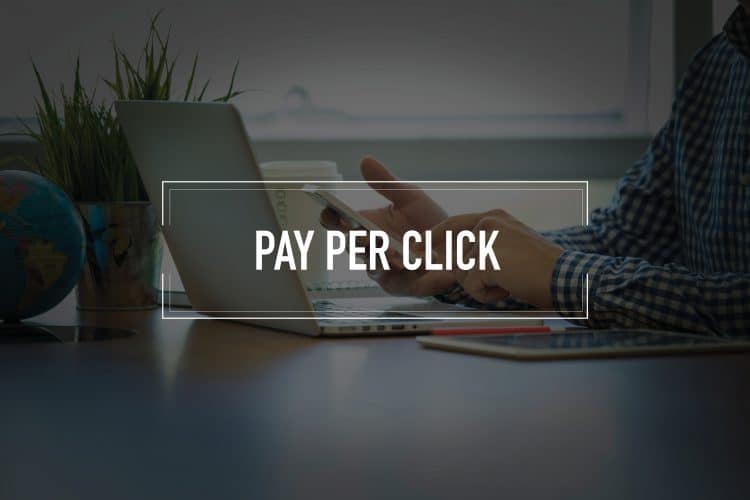
A PPC ad, specifically one that’s on a search engine like Google, will require a good set-up to ensure that your ad is visible to those who need it. That means selecting specific keywords that relate to what your law firm offers (such as “accident lawyer Indianapolis”).
Many of these ad services also allow you to target a geographical location to ensure local traffic.
One of the key issues with using PPC ads for a law firm is the price. Depending on how much competition you have in your local area, you might be charged upwards of $300 for every user that clicks on your ad.
Unlike SEO, these ads will only provide temporary results. Once you stop running the ad, your website will no longer be on that first page of Google. In a way, this is a shortcut to get your law firm on the front page right now.
Online reviews are everything these days, whether you’re hiring a personal injury lawyer, buying a new smartphone, or visiting a national park. Having online reviews from past clients is a surefire way to capture leads, especially since over 90% of users will read reviews first.
Consistent bad reviews will send your potential clients elsewhere. On the other hand, good reviews will help to guarantee more clients want to work with your firm.
How many stars your firm receives on Google or Yelp will determine how much business you can generate. The research shows that you can improve your revenue by 5 to 9% increase by only improving your Yelp review by a single star.
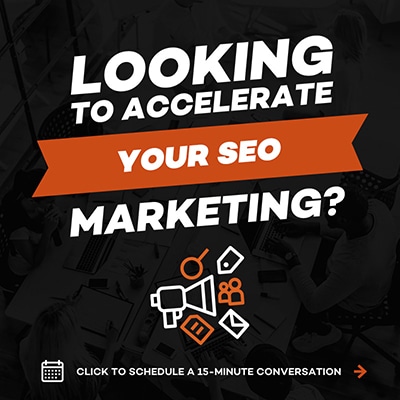 Yet, you need to figure out how to get these reviews in the first place.
Yet, you need to figure out how to get these reviews in the first place.
Getting your past clients to write these reviews will be the most difficult part. The good news is that most will put in the time to write a review if you ask them to.
Just keep in mind that people are more willing to write a review if they had a really good or really bad experience. That means you need to guarantee that your clients love working with you.
To get these reviews, you need to be sure that you’re creating profiles for your firm on as many platforms as possible. That includes Google, Yelp, Lawyers, FindLaw, and Avvo.
There’s no doubt that a good chunk of people will use the internet to find a lawyer in 2021. Yet, clients want to be sure that they’re choosing a reputable lawyer that can help them win the case when it comes to a potential million dollar lawsuit.
That often comes in the form of a referral.

A referral is where a person gets your contact information or interest in your firm as a result of talking to a friend, family member, or coworker. It appears that about 62% of people looking to hire a lawyer will get input from those closest to them.
The best part about referrals is that they’re free and give you a bit of a headstart on building a relationship with your future clients. There’s already a little bit of trust between you and the client, even before you officially meet.
The problem is that referrals will only happen if you consistently produce satisfied clients that you keep in touch with well after the suit has ended.
From a marketing sense, you need to work hard to guarantee these referrals.
The most important thing you can do is maintain somewhat of a relationship with your current and past clients. That can be as easy as inputting their email address into your CRM and signing them up for a monthly newsletter.
There are also more personal ways to do this.
You might prefer to deliver seasonal gifts to 20% of your best clients or send out nice holiday cards during the winter months. The overall goal here is to get clients to appreciate their relationship with you enough to bring you business.
The current research shows that about 38% of those looking for a lawyer will turn to the internet to help in their search. The issue with just doing a simple Google search is clicking through dozens of websites and trying to figure out which is best for you.
Creating profiles on legal directories makes this endeavor easier for your clients.
All personal injury lawyers need to have a profile on directories like FindLaw, Justia, Avvo, and Lawyers. This will help clients to compare your firm to another local firm side-by-side and weigh the pros and cons of each.
Anyone in your area who wants to hire a personal injury firm should be able to find you.

Thankfully, there are benefits on your end when you register with all of the local legal directories.
When you create these profiles, you’re helping to improve your ranking on Google. That’s because these directories will set up a backlink to your website and have your information show up more frequently on Google.
As you know, the more often your name is used, and your website is linked, the higher your website will be on Google. The more views, the more visitors and the more clients you can secure.
Your law firm’s website is exactly where you want your clients to be. Your website will let your clients know exactly what type of services you offer, what your rates might be, and how to get into contact with you.
However, you have to convince your website visitors that you’re worth hiring. What sets your firm apart from every other firm in a 30-mile radius?
One of the most efficient ways to do this is by setting up a blog on your law firm’s website. You can make short or long posts about common legal topics, trends in lawsuits, or even legal advice that the public would find useful.
Examples include blog posts like:
The goal is to figure out what your future clients want to know and to give them the advice they need through a well-written blog post.
Making posts like these can help you to draw in up to 55% more visitors. That’s because these posts will likely include your targeted keywords (SEO) and increase the number of pages from your website that can be found on Google.
Ultimately, you want to show your future clients that you’re a lawyer for more than just the revenue. A blog offering useful advice and demonstrating yourself as a voice of reason in your industry can secure more clients.
Did you know that just about every large law firm in the United States uses a customer relationship management (CRM) tool?
About 77% of law firms consistently use one of these tools to keep track of client information and contact schedules. Expectedly, the law firms that use CRMs are known for producing greater ROI.
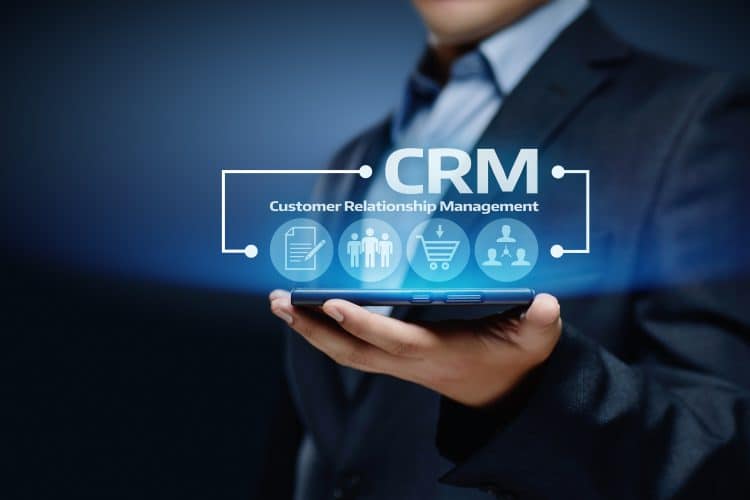
You’re probably wondering what a CRM is and why it’s useful for marketing your law firm.
In simple terms, a CRM is meant to keep your law firm organized. You’ll be able to keep all of the important contact information from clients and leads in one easy-to-use program. These tools make it much less likely that you lose clients due to a lack of contact.
The most important part of a CRM is that it keeps your relationships from fading. To understand just how important a CRM is, take a look at what a CRM can do for your firm:
Here’s a video describing exactly what a CRM is and how it can impact your firm for the better.
https://www.youtube.com/watch?v=hnEQq7kNFWo
Your law firm’s homepage needs to show up on Google search results to drive traffic. One of the problems with this is that your clients might be looking for a specific type of information, like personal injury lawsuit advice.
A client looking for this type of information would have to navigate through your website to find the information that they’re looking for. Unfortunately, a poorly designed website might cause a potential client to look elsewhere for their answer.
That’s where you’ll want to add several landing pages to your website.

A landing page is a specific page on your website that targets a certain audience. In many cases, you’ll have a different landing page for different types of lawsuits or different towns within your local area. This helps you to target many different keywords to attract more clients.
For example, you might have landing pages like:
What’s actually on your landing pages is perhaps even more important than having them in the first place.
Your landing pages will typically have some sort of offer, incentive, or sign-up form to receive additional information from your firm. These pages should also include information about your firm, such as how much you’ve won in settlements or how many years of experience you have.
Landing pages can be monumental for securing more clients for your firm. Websites with 40 or more landing pages are likely to secure 12 times more leads than websites with fewer than 5. The more, the better.
There’s one very important thing that you need to remember about marketing in such a specific niche: It’s not useful to cast the widest possible net. Instead, you want to use targeted marketing and advertising strategies to bring in people who need your services.
These tactics can help to save your firm some extra money that you may be wasting on outdated or broad marketing techniques. Figure out the audience you’re looking to reach and tailor your marketing to reflect it.
